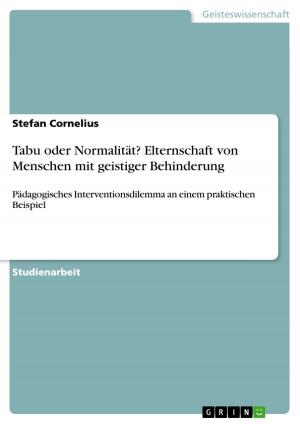Evicence-Based Questionnaire Evaluation and Refinement
Business & Finance, Management & Leadership, Operations Research| Author: | Anonymous | ISBN: | 9783640980055 |
| Publisher: | GRIN Verlag | Publication: | August 9, 2011 |
| Imprint: | GRIN Verlag | Language: | English |
| Author: | Anonymous |
| ISBN: | 9783640980055 |
| Publisher: | GRIN Verlag |
| Publication: | August 9, 2011 |
| Imprint: | GRIN Verlag |
| Language: | English |
Seminar paper from the year 2008 in the subject Business economics - Operations Research, grade: 1,00, Jacobs University Bremen gGmbH, language: English, abstract: The Eurobarometer (EB) is a survey series that has been conducted since 1973 to monitor public opinion on several issues concerning the European Union. It provides a dynamic measure of the EU citizens' economic, social and political attitudes toward issues related to the EU including attitudes towards EU policies and institutions and general socio-cultural and political orientations of its citizens, based on a set of standard question over time. In addition to conducting standard EB survey, the EU also conducts special EB surveys which focus on a particular topic of interest to the EU. EB 225/Wave63.1 titled 'Science and Technology, Social Values, and Services of General Interest' is one of such special surveys which addressed three special topics. One of the topics was 'Social Values, Science and Technology'. In order to measure EU public's social values in relation to science and technology, it measured social values of respondents.One indicator of social values used by the EB questionnaire was social and political attitudes which assessed the values and ethical principles of European citizens on themes such as overall satisfaction with life, their religious and spiritual beliefs and children's upbringing. The measure of social and political attitude also included measuring educational values which were assessed on the basis of eight values - independence, obedience, hard work, sense of responsibility, imagination, tolerance and respect for other people, thrift, economizing and avoiding waste and determination, perseverance. These eight values have been used in studies that have used Kohn's self-direction values. By self-direction it means 'the capacity to take responsibility for one's actions and that society is so constituted as to make self-direction possible; the opposite pole of this concept is conformity to external authority' (Kohn et al.,1997). Hence, using Kohn's theory that 'child-rearing values reflect a broader set of values' (1977), and using the differentiation of Kohn's value items into different factors provided by Yi et al. (2004), education values can be divided into two sub constructs: 1. Self-direction values with the items 'Independence', 'Imagination', 'Determination/Perseverance', 'Sense of Responsibility' and 2. Conformity values with the items 'Hard work', 'Obedience', 'Thrift/ Economizing and avoiding waste'.
Seminar paper from the year 2008 in the subject Business economics - Operations Research, grade: 1,00, Jacobs University Bremen gGmbH, language: English, abstract: The Eurobarometer (EB) is a survey series that has been conducted since 1973 to monitor public opinion on several issues concerning the European Union. It provides a dynamic measure of the EU citizens' economic, social and political attitudes toward issues related to the EU including attitudes towards EU policies and institutions and general socio-cultural and political orientations of its citizens, based on a set of standard question over time. In addition to conducting standard EB survey, the EU also conducts special EB surveys which focus on a particular topic of interest to the EU. EB 225/Wave63.1 titled 'Science and Technology, Social Values, and Services of General Interest' is one of such special surveys which addressed three special topics. One of the topics was 'Social Values, Science and Technology'. In order to measure EU public's social values in relation to science and technology, it measured social values of respondents.One indicator of social values used by the EB questionnaire was social and political attitudes which assessed the values and ethical principles of European citizens on themes such as overall satisfaction with life, their religious and spiritual beliefs and children's upbringing. The measure of social and political attitude also included measuring educational values which were assessed on the basis of eight values - independence, obedience, hard work, sense of responsibility, imagination, tolerance and respect for other people, thrift, economizing and avoiding waste and determination, perseverance. These eight values have been used in studies that have used Kohn's self-direction values. By self-direction it means 'the capacity to take responsibility for one's actions and that society is so constituted as to make self-direction possible; the opposite pole of this concept is conformity to external authority' (Kohn et al.,1997). Hence, using Kohn's theory that 'child-rearing values reflect a broader set of values' (1977), and using the differentiation of Kohn's value items into different factors provided by Yi et al. (2004), education values can be divided into two sub constructs: 1. Self-direction values with the items 'Independence', 'Imagination', 'Determination/Perseverance', 'Sense of Responsibility' and 2. Conformity values with the items 'Hard work', 'Obedience', 'Thrift/ Economizing and avoiding waste'.















